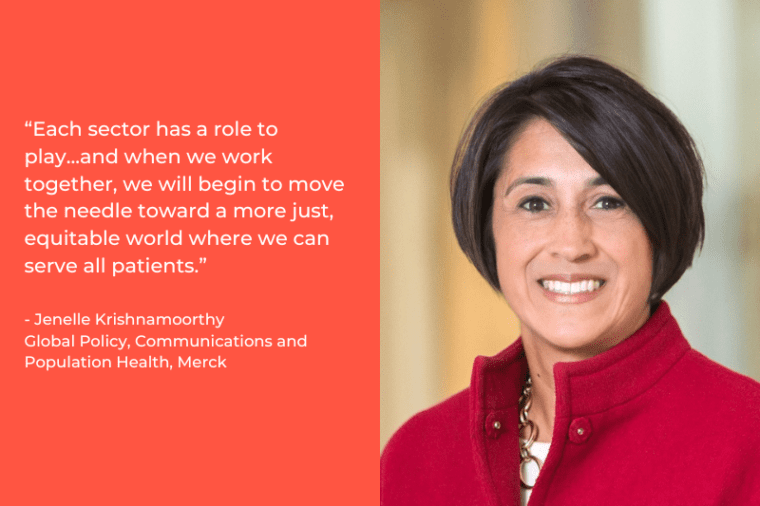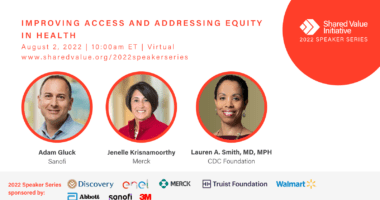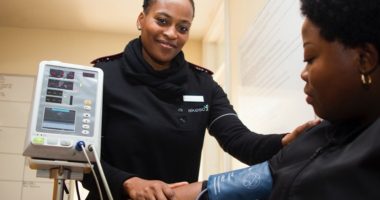In the lead up to our conversation with Jenelle Krishnamoorthy, PhD, VP and Head of Global Public Policy and International Affairs at Merck, as part of our 2022 Speaker Series, we sat down with her to discuss how health care industry leaders are working to improve access to health, improve equity at their companies, and why this work is so important. On August 2, Dr. Krishnamoorthy will be in a conversation with Adam Gluck, Senior VP of Corporate Affairs at Sanofi, in a webinar moderated by Dr. Lauren Smith, Chief Health Equity and Strategy Officer at the CDC Foundation. These leaders will discuss how they are driving more equitable health outcomes, a critical step for advancing equity more broadly. The webinar is free and open to the general public. Register here today.
Shared Value Initiative: As a pediatric clinical psychologist and public policy expert, what brought you into the private health care sector, and Merck in particular?
Jenelle Krishnamoorthy: Having a father who is a first-generation immigrant to America, I saw firsthand how critical it was to have access to health care and how complex the system can be to navigate. I have always believed that it is my responsibility to give a voice to so many who are not represented when health policy decisions are being made that could have an impact on their lives. This perspective has followed me through academia, seeing patients, working in government and now at Merck. Every day, we work to ensure our life-saving medicines and vaccines reach individuals and communities that have the most unmet medical need. In addition, Merck has a strong commitment to supporting the overall strengthening of health care systems, infrastructure, and workforce, which are all factors that made Merck a place I wanted to work!
Shared Value Initiative: Merck has a long-standing commitment to health access and equity. The company’s Access to Health Guiding Principles provide a clear demonstration that Merck thinks about this work holistically across the company. How are these principles applied?
Jenelle Krishnamoorthy: Merck’s purpose as a company it to use the power of leading-edge science to save and improve lives around the world. Guided by this purpose, our company has a long legacy of pioneering work that creates value for society. This purpose also underpins our strategic priorities and every decision we make. One of our focus areas is our commitment to access. This includes product access and health equity, and we have three specific, measurable goals here:
- We will further advance health equity by reaching 30 million people in low- and middle- income countries (LMICs) and in U.S. underserved populations with our social investments, by 2025.
- We reach at least 75% of countries around the world annually with our products,
- We will enable 100 million more people to access our innovative portfolio globally, through access strategies, solutions and partnerships, by 2025 (read more in our ESG Report here).
Our Access to Health Guiding Principles inform how we continue to sustain this focus, and articulate our access strategies and priorities for external stakeholders. Our fundamental approach is to embed access in our business strategies and operations around the world, rather than assigning ownership to one unit or function. It truly cuts across the company. This approach facilitates upstream planning from the earliest stages of product development through adoption, as well as planning between markets and within them. It allows us to be comprehensive in our approach, and also move with agility.
When the COVID-19 pandemic hit, we saw a clear and urgent need to act fast. Our goal from the earliest stages of COVID-19 research and development (R&D) was to be able to support supply for our therapeutic candidate through global and national government procurement efforts at the same time in low- and middle-income countries as in high-income markets – through our own product and through our generic licensees. Even before we had Phase III data, we entered into licensing agreements with multiple generic companies, so that they could be prepared to make the treatment available in more than 100 LMICs once we had our antiviral therapy, authorized for emergency use. And our commitment goes beyond simply granting a license. Merck provided technical packages for active pharmaceutical ingredient production and formulation, input into generic company-conducted clinical studies, and regulatory assistance for generic regulatory filings. In addition to our actions, the Bill and Melinda Gates Foundation announced that it would provide $120 million in volume guarantees, so generic manufactures could scale up production to produce and distribute the product with speed, when it mattered most.
When faced with a public health crisis like COVID-19, we knew we couldn’t do it alone if we wanted to have the greatest impact. Collaboration across sectors has been and will be key to achieving our shared goal of timely and equitable access to COVID-19 antiviral treatment globally. To that point, we know that each sector has a role to play, and when we work together, we will begin to move the needle toward a more just, equitable world, where we can serve all patients.
Shared Value Initiative: The COVID-19 pandemic response and social justice reckoning has raised the consciousness for us all in the role we play in advancing equity. What changed for Merck, as it relates to improved access to health?
Jenelle Krishnamoorthy: Advancing health equity is not new at Merck, and we have always taken on society’s most urgent health challenges from HIV/AIDS, to Ebola, to cancer. One of the longest standing public-private health collaborations in the world is our Mectizan Donation Program, working with partners to achieve a future free of onchocerciasis (river blindness) and lymphatic filariasis. We have donated 4.4 billion treatments since program launched in 1987, and there are now more than 15 million people globally who no longer need treatment, thanks to community-level efforts. In 2011, our company launched Merck for Mothers, a $500 million global initiative to help create a world where no woman has to die while giving life. The current moment and social justice reckoning allows us – and challenges us – to do more to build on the success of our access to health initiatives and take them even further.
In 2020 we knew that health equity should be a top priority for our company, so we expanded our health equity capabilities by creating a specific team dedicated to advancing health equity. This team works to integrate health equity across Merck’s value chain, so that we can increase the reach of our life-saving innovations. We are embracing a culture of diversity, equity, and inclusion more than ever before across the full enterprise. Our ability to meaningfully innovate depends on a diverse and inclusive workforce, operating with integrity, activated to bring the best of their talent and imagination.
We also know that to be successful in advancing health equity, we need to look outside our company and partner with organizations who are on the ground and understand local community context. Due to the COVID-19 pandemic, cancer screenings declined by 6-11% in the U.S., after years of sustained screening prevalence[1]. In light of this decline, we partnered with American Cancer Society (ACS) to mobilize local communities to improve cancer screening routines to pre-pandemic levels and prevent later stage cancer diagnosis, especially among underserved communities. In partnership with ACS, we supported the development of regional and local consortia, and state-based interventions to improve health equity in under-resourced communities. I’m happy to say that we have seen a 3-4% increase in screening rates for breast and colorectal cancers among participating federally qualified health centers, 135,000 additional people are now up-to-date with their cancer screening, and 4,300 breast, cervical and colorectal cancers were diagnosed that otherwise may not have been caught.
Shared Value Initiative: What public policy priorities have the biggest opportunity to shape improved health equity in years to come, and what is Merck’s role in influencing them?
Jenelle Krishnamoorthy: The COVID-19 pandemic has heightened our awareness of the crucial role of public and private sector collaboration for pandemic preparedness, and that it requires an all hands on deck approach. Our future public health infrastructure, and future health for all of our patients relies on our ability to mobilize multi-sectoral partners for improved health security and pandemic preparedness.
One crucial element of this is early detection and response. We must ensure that there are sustainable funding models to support public health infrastructure that meets the needs of all patients by partnering with local community-based organizations and leveraging community health workers. We can work to accelerate data system modernization so that we can identify where our most vulnerable populations are and create innovative solutions to meet them where they are. And we need our government partners to continue strengthening surveillance systems and emergency response systems, including rapid deployment of antivirals and enabling test and treat policies, as we have seen in access to HIV and HCV treatments.
What needs to be different? We’re still seeing unnecessary inefficiencies in health care delivery, which ultimately drive and exacerbate health disparities. One such example brought to light in the COVID-19 response was regulatory harmonization. The wide diversity of regulatory processes, procedures, and expectations worldwide delayed access and uptake of life-saving medicines and vaccines and impeded improvements to manufacturing processes and products. Merck has a role to play in helping to address it, but it’s a complex policy issue that can only really be solved through multistakeholder partnership and collective action.
For our part, our industry must continuously invest in R&D for broad acting prevention and treatment options, through incentives models that reward risk-taking and innovation that can be deployed worldwide. Merck will continue to apply its “principles-based” planning for equitable access to product development and delivery. We remain committed to advancing science, and equity, in the collective commitment to prevent future pandemic threats.
[1] Fedewa A, Star J, Bandi P. Changes in Cancer Screening in the U.S. During the COVID-19 Pandemic. JAMA Netw Open. 2022;5(6):e2215490. Accessed 7/18/2022




